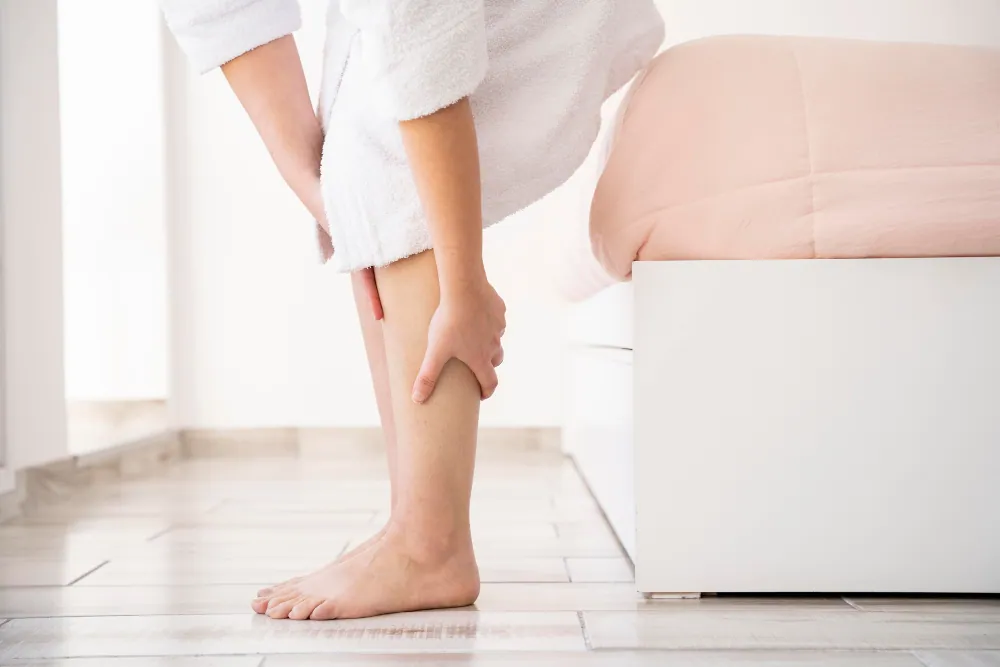You’re not alone if you’ve ever experienced a nighttime leg pain or cramp that kept you up.
In fact, up to 59% of adults have woken up in the middle of the night with uncomfortable leg cramps.
Your legs may ache at night for a variety of reasons.
Often felt in the calf, foot, or thigh, these severe muscle pains, also referred to as “Charley horses,” can last for a few seconds to several minutes at a time.
Even so, if they happen frequently, they may have an adverse effect on your daily schedule and sleep habits.
Fortunately, there are several methods for reducing, treating, and avoiding nocturnal leg cramps.
It’s crucial to see a doctor for a proper diagnosis and treatment if you have severe or persistent leg pain.
The following list includes some possible causes of nighttime leg pain.
Causes of Leg Pain at Night
Finding the precise source of our leg pain can be challenging.
Idiopathic refers to the fact that there is no known cause for some leg cramps.

However, there are a number of widely accepted theories about what causes calf cramps and thigh pain at night, including.
Muscle Fatigue – Excessive high-intensity exercise is one of the most frequent causes of leg pain because overworking your muscles can cause them to cramp at night.
Nerve Issues – Leg cramps can be brought on by nerve problems, including pinched nerves and spinal cord injuries.
Restless Leg Syndrome (RLS) – A neurological condition called RLS is characterized by an uncontrollable urge to move your legs, which is frequently brought on by uncomfortable feelings like tingling, itching, or aching.
When you’re trying to unwind and fall asleep at night, symptoms are usually at their worst.
Sitting or standing for Long Time – Long periods of time spent sitting or standing can reduce blood flow, which increases the likelihood of leg pain or cramps.
Pregnancy – Leg cramps are a common nighttime symptom of pregnancy, typically in the second or third trimester.
Drugs – Leg cramps are a possible side effect of some medications, including blood pressure medications, diuretics, and statins.
Anxiety and Stress – It may be easier to notice muscle tension and discomfort when you’re trying to unwind and fall asleep as a result of stress and anxiety.
Inadequate Bedding or Sleeping Position – Leg discomfort can occur at night because of an uncomfortable mattress or a sleeping position that puts pressure on your legs.
Age – Age can also play a role because as you get older, you’re more likely to experience leg pain and other types of nighttime pain.
Diseases Related to Leg Pain and Cramps at Night
There are a few conditions that can cause cramps in the calves, feet, or elsewhere.
Peripheral Artery Disease (PAD) – PAD is a narrowing of the arteries that leave the heart and travel to other parts of the body.
The most typical type of “PAD” reduces blood flow to your legs and feet.
Coronary Artery Disease (CAD) – Similar to the aforementioned conditions, coronary artery disease (CAD) affects the coronary arteries that supply blood to your heart.
Arthritis – Arthritis, or other inflammatory joint conditions, can cause joint pain and stiffness, which may be more pronounced at night.
Dehydration or Electrolyte Imbalance – Muscle cramps and leg discomfort can be brought on by dehydration or an electrolyte imbalance.
These conditions can also cause inadequate hydration.
Spinal Stenosis – Spinal stenosis is a narrowing of the spaces in your spine that can irritate your nerves.
Kidney Damage – When one or both kidneys stop functioning, it is called kidney failure.
Diabetes – Diabetes may cause up to 55% of people to develop diabetic neuropathy, a form of nerve damage.
Leg Pain at Night Signs and Symptoms
It’s possible for people to wake up at night with leg pain, severe pain, or cramping in various parts of the body.
Leg aches that can occur while you sleep include
Calf Pain – The most frequent type of nighttime leg cramps are calf cramps.
However, they can also affect other areas of your leg.
They typically involve your gastrocnemius or soleus muscles.
Foot Pain – Since your foot’s muscles work similarly to your calf muscles, some nocturnal cramps may cause a tightening here.
Thigh Pain – Nocturnal cramps can cause thigh pain at night.
Knee Pain – Knee pain at night could be a sign of an injury, inflammation, or arthritis.
It can also be a sign if you experience both knee and ankle pain at night.
This will depend on the kind of nocturnal leg pain in terms of the symptoms themselves.
Leg aches, sharp knee pain, or even leg bone pain could be present.
Up to 25% of patients also experience daily symptoms in addition to the initial muscle tightening or spasm brought on by the leg cramps.
You should consult a doctor right away if the problem persists or if you have persistent cramps.
Home Remedies For Nighttime Leg Pain
Even though leg cramps typically only last a few minutes or even seconds, they can cause intense leg pain at night, which can be uncomfortable and interfere with your sleep.
It’s critical to manage this problem given how crucial sleep is to our health and wellbeing.
Thankfully, there are some leg pain treatments and prevention strategies you can try to help treat your sore legs and improve your quality of sleep.
- To stretch out any tight muscles, straighten your leg and flex your foot.
- Massage the muscles to relieve any knots using your hands or a foam roller.
- For better muscle movement and blood circulation, get out of bed and press your feet against the floor or take a short walk around the room.
- Use a heating pad or an ice pack on the sore area of your leg to relieve the pain. Applying a cold or hot press. Just be mindful to avoid burning your skin.
- Lifting your legs slightly, especially before bed, can help to improve blood circulation and lessen swelling and discomfort.
- If you have circulation problems, compression stockings or socks can help improve blood flow and lower your risk of getting leg cramps.
- Soaking in a warm Epsom salt bath may help you relax your muscles and ease leg pain. Muscle cramps may be eased by the magnesium in Epsom salt, which is thought to be absorbed through the skin.
- You can take pain killer drugs available over-the-counter, which may temporarily relieve leg pain and aid in sleep.
Final Words
Keep in mind that the best course of action is frequently prevention.
Leg cramps can be avoided by drinking enough fluids, eating a balanced diet, and engaging in regular stretching and exercise.
Consult a healthcare provider for a thorough evaluation and suitable treatment if your symptoms continue or get worse.
Read Also👇👇👇
Which Planet Rains Rubies and Sapphires




